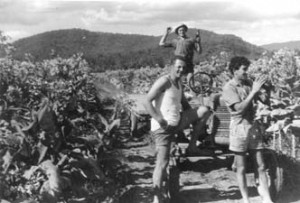Author: Luigi Mainente, Italian community, George Hanna Memorial Museum
It was 1959. I was 22. I left Verona, Italy with my faith and my hope to return after two years. The employment offices used advertisements of beautiful Australian beaches and pineapple farms to entice us to migrate to Australia. I was alone, knowing not a soul. With little money I could not afford to return home but Sydney became my future. Then I met my future wife and ended up staying in Australia.
Born: Cattignano, Verona, Italy
Migrated: 27th December 1959, 22 years of age
Transport: Ship ‘Sorento’ from Trieste
Luggage: My faith and my hope to return to Italy after 2 years
Journey: 42 days
First Job: Tobacco farm worker
Hometown
The town of Cattignano of San Giovanni Ilarione is in a province of Verona in Italy. My parents, grandparents and great grandparents were all born in this town. It is a little town with a population of 300 people. It is 500 metres above sea level and its produce is animal husbandry, cherries, potatoes, wheat, corn and grapes.
Decisions
I was born just prior to the Second World War and that era was a very difficult time. There was no sugar, salt, pasta and many other supplies were scarce. At 17 years of age I had gone to work in Switzerland and then to France for four years in total. Back in Italy I was unemployed and was sent to Genoa to find work. The employment offices used advertisements of beautiful Australian beaches and pineapple farms to entice us to migrate to Australia for two years. I decided to become a Government-sponsored migrant to Australia, expecting to be placed in some form of employment when I arrived.
Feelings
I have a vivid memory of saying goodbye to my dear parents on the morning of 26th December, 1959. I said goodbye to all my brothers and sisters – we were 11 altogether. It is hard for me now to express my feelings from 1959, except from the point of view that I was a very young man with high hopes and aspirations for the future. The reader will read between the lines to see the disillusion, hurt and anger. Alongside the sadness of leaving home and family, there was the hurt of being unwanted by one’s own country and then tricked, with promises reneged by the Australian Government.
Journeying
I travelled by bus from Verona to Genoa to get the boat but on arrival the ship agency sent us back north by train on a 12 hour trip to Trieste because the luxury liner at Genoa was too expensive for poor Government-assisted migrants! The rest of the trip was the beginning of hell for me. There were 1,300 passengers of many nationalities on the old ship. We were placed in the bottom cargo area where it was suffocatingly hot with no air circulation. We had to sleep in dormitory style with three-tiered bunks.
Our journey was via Port Said (Egypt), Colombo (Sri Lanka) and then to Australia via Fremantle to Melbourne. When we disembarked from the boat there was an empty train with wooden seats waiting. Many of my fellow migrant travellers were met by relatives and friends who were calling them by name. I was alone, knowing not a soul. I was accompanied to the first train carriage and in 15 minutes was on my way to an ex-army camp and what I call the “Horror Shock Shacks” of Bonegilla. This was not like the advertising gimmicks we had seen back in Italy in the Offices of Employment in Genoa. We had been tricked!
Impressions
My first impressions as I travelled to Bonegilla were of the drought-stricken land and tall dry-looking gum trees. Bonegilla was miles from anywhere and we slept two to a room in little sheds. It was very hard to endure, more so because I did not speak English then. Luckily for me, nine days after I arrived a truck pulled up and the driver spoke to me in Italian and asked me “Would you like to come and work with me?” I said yes immediately. The driver’s name was Aurelio Cabai. I didn’t know it then, but we became life-long friends. He took me to his tobacco farm in Myrtleford in Victoria. I was employed by him on his share-farm from February to August 1960 and earned £650.
Then I found temporary work here and there, then worked on another share-farm with two other men. It was hard work cultivating, picking and grading the tobacco. I decided to invest some of my £650 in this share farm. At the end of the season we sent the raw tobacco to Melbourne to sell but unfortunately it was rejected. All of us lost our investment. At this point Social Security provided the single men with £50 to get us on our feet again. In desperation I headed for Sydney with the £50 in my pocket. On the way I put a deposit on a block of land at Dapto, on the South Coast.
With little money I could not afford to return home but Sydney became my future. Then I met my future wife and ended up staying in Australia. In 1963 I married Rosalia an Italian migrant from Sicily. She worked for King-Gee, sewing men’s overalls. After many sacrifices and the joy of knowing many good people, we built our own house, a beautiful two-storey brick house which we’re very proud to own and live in. We have a wonderful daughter, Rita, who is completing her degree in French and Italian languages.
Life
In Sydney I worked for the Sydney Water Board, Orica (ICI), Kelloggs and Australian Paper Mills. I eventually obtained a licence for driving a crane and I have driven cranes for 36 years. I have never been out of a job with this type of work. I worked for Botany Cranes in the very industrialised zone of Botany from 1974 until 2000.
I remember the construction of Port Botany and working to put the first crane together. Now there are 15 cranes and many container depots at the Port. I worked with cranes back and forth and saw the great reclaiming work on the Bay. There have been great changes over the years I have worked at Botany. The place has changed from primitive animal leather factories to other modern factories. In conclusion, the reader will have picked up my underlying feelings of deep hurt and anger as a migrant to this country 40 years ago. Whilst I can now say good things about Australia and I am now a citizen, I would just like to conclude with the very real facts of being a migrant. In a word, there is no worse or cruel thing in life than to find oneself in a place where one is not understood and where one is humiliated by offensive name-calling such as dago or wog. The hurt doesn’t go away.


